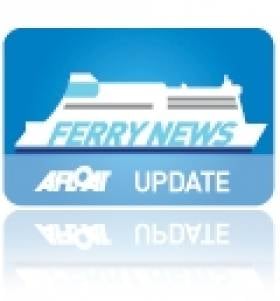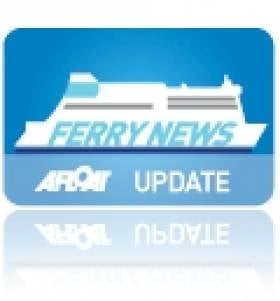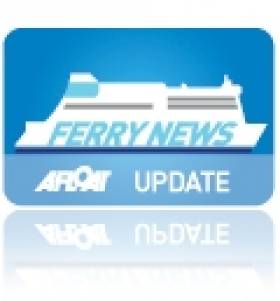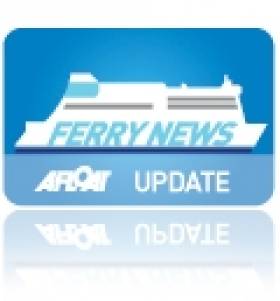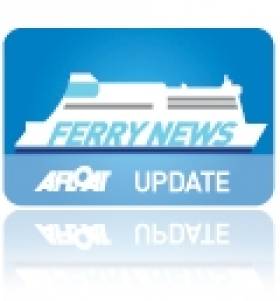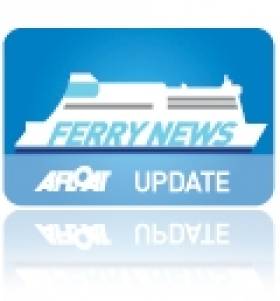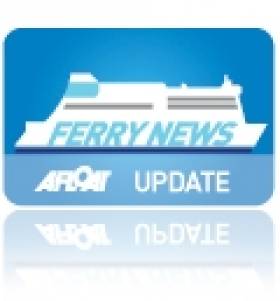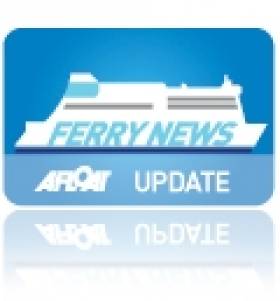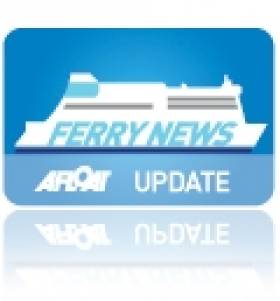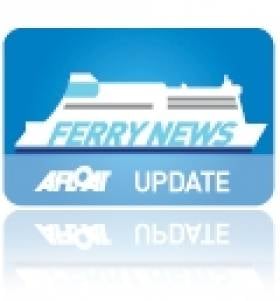Displaying items by tag: Ferry news
Brittany Ferries 'Flagship' Sets Sail for Summer Season
#FERRY TO FRANCE – Brittany Ferries flagship Cork-Roscoff route is underway, as the first sailing in 2012 of the seasonal-only operated service started last weekend and runs to early November. Serving on the 14 hour route which is the shortest sailing to France, is the luxurious flagship Pont-Aven, writes Jehan Ashmore.
The 2,400 passenger /650 vehicle capacity Pont-Aven is unique to Irish services as she features a swimming pool. The indoor facility located on the top deck, includes a leisure area and pool bar which is open during the summer season and on busy off-season crossings.
In addition there are restaurants, a piano bar, main lounge, café and shop facilities. She has a wide choice of cabin accommodation that includes 'Commodore' cabins complete with balconies. For details about sailing schedules click HERE.
Roscoff is set in picturesque surroundings on the north-west Breton coast and the ferryport is a short distance even by foot to the town which has restaurants facing the coast. There is a botanical garden and a century-old thalassotherapy that has seawater and seaweed treatments used for healing and relaxation therapies.
Bank Holiday Marks Start of Manx Sailings
#ISLE OF MAN FERRY – This Easter bank holiday weekend marks the start of the Isle of Man Steam Packet Co.'s seasonal-only Dublin-Douglas ferry service, with a sailing scheduled to depart this evening, writes Jehan Ashmore.
The wave-piercing catamaran fastcraft Manannan had departed the Manx capital this afternoon to form the inaugural outbound sailing, which takes nearly three hours to complete. The 96m fastcraft is the largest of her type in the Irish Sea and she was built by InCAT in Hobart, Tasmania. She also maintains sailings on the Douglas to Belfast and Liverpool routes.
For sailing timetables across the network of routes to the Isle of Man click HERE and for a guide about the fastcraft and conventional ferry Ben-My-Chree click this LINK.
Ferry For Falmouth
#FERRY NEWS – European Endeavour (2000/ 24,046grt), the largest of three ferries running for P&O's Dublin-Liverpool route departed from the capital's port this afternoon bound for A&P Groups dry-dock facility in Falmouth, writes Jehan Ashmore.
The former Dover-Calais serving ferry started working on the Irish Sea on a full-time basis last year as previously reported. Her fleetmates are the 17,000 tonnes sisters Norbank and Norbay.
The trio of ro-pax ferries are to a design where freight is predominately the main cargo and passenger capacity is reduced considerably compared to most conventional ferries. European Endeavour can handle 130 lorries and accommodate 210 passengers whereas her fleetmates are the reverse with greater freight capacity for 150 freight units and a reduced capacity for 114 passengers.
P&O are the only ferry firm on the route providing passenger and car ferry service though they do not cater for 'foot' passengers. Their rivals Seatruck Ferries offer the only dedicated freight-operation on a network of routes on the north Irish Sea including the Liffey-Mersey link, where in recent months new tonnage has entered service.
Winds of Change face former Fastnet Ferry and Sistership
#FERRY NEWS - With the acquisition of Fastnet Line's Julia to C-BED as previously reported, the Dutch owned company's fleet rises to three floating hotels which are used to accommodate workers in offshore wind-farm energy installations, writes Jehan Ashmore.
All three vessels are former ferries and one of which the Wind Ambition was in recent years based in in the north Irish Sea. The third vessel is Wind Solution, for photos and technicl details of these vessels click HERE. While the former Cork-Swansea ferry has been renamed Wind Perfection (1981/22,161grt) , she remains berthed in Cork city docks having laid-up there since the route's closure last November.
The vessel is however due to undergo an extensive refit in The Netherlands before she takes up a charter in the North Sea with Siemens in October, as a floating hotel for wind-turbine industry employees.
By using the vessel Siemens are to save valuable time and money which would otherwise by the daily transfer of construction workers to and from the mainland. For a video computer simulation showing the different logistics involved between an offshore floating hotel and a conventional hotel onshore, click HERE.
Wind Perfection was originally built as Olau Britannia and shared sailings with sistership Olau Hollandia for a UK-Dutch route between Sheerness-Vlissingen operated by Olau Line.
The sisters were replaced by newer vessels on the North Sea route in the late 1980's and sold to various owners during the years. Before Julia made her Celtic Sea debut, she last ran under the same name for Stella Line on the St. Petersberg-Helsinki route.
Incidentally her sister Norlandia (1981/21,473grt) operates also from the Finnish capital to Tallinn for Eckero Line. Likewise she too is due to undergo changes as she is to be replaced later this year as a second-hand ferry from Mediterranean owners was sold to the Baltic Sea operator.
- Ferry news
- Fastnet Line
- CBed
- Celtic Sea ferry operator Fastnet Line
- Olau Line
- Julia
- Olau Britannia
- Olau Hollandia
- CorkSwansea
- Stella Lines
- Siemens
- Ports and Shipping News
- Irish Sea ferry news
- Eckero Line
- Nordlandia
- HelsinkiTallinn
- Wind Perfection
- Wind Ambition
- Wind Solution
- Offshore Floating Hotels
- WindFarm Instalations
- North Sea windfarms
Former Fastnet Ferry to Become Floating Hotel
#FERRY NEWS – The former Fastnet Line ferry Julia (1981 / 22,161grt) is to embark on a new life as a floating dormitory for workers building and servicing offshore wind turbines in the North Sea, according to The Examiner.
The rather ignominious end for the ferry once billed as one of the jewels in Cork tourism industry, marks the final chapter in the short and troubled life of Fastnet Line, which was set up by West Cork Tourism Co-operative.
At over 30 years-old the ship, which had capacity for 1,860 passengers, made its maiden voyage on the Cork-Swansea route in March 2010. She was bedevilled by mechanical problems in the first few days of operation, and in late 2011 the Celtic Sea service was withdrawn due to higher-than-expected fuel prices.
It had been hoped to restart the route this year, but Fastnet Line went into receivership last month. The vessel had been sold, reportedly for €5m, to C-BED, a Dutch-based company which are to rename her Wind Perfection.
For more on this story about the short-lived ferry operation click HERE.
Seasonal Start for Three In A Row
#FERRY NEWS – By this weekend three seasonal-only operated routes from the island of Ireland will have resumed service since the recent change of the clocks marking the start of summertime, writes Jehan Ashmore.
Sailings started today on Stena Line's Dun Laoghaire-Holyhead (120 minutes) fast-craft HSS Stena Explorer operated service. The central corridor route closed last September due to cost-saving measures as previously reported. For further details on sailing schedule click HERE.
The reopening of the Welsh route follows yesterday's launch of P&O Ferries fast-craft sailings to Scotland between Larne-Troon (2 hours) served by the 92m Express. She also runs additional sailings on the year-round Larne-Cairnryan route served by a pair of conventional ferry sisters. To read more information on both sailing route schedules click HERE.
The remaining route to re-open is Brittany Ferries Cork-Roscoff (14 hours) service operated by the 2,400 passenger 'flagship' Pont-Aven, which features an indoor swimming pool. Her first sailing for this year is tonight's sailing from the Breton port.
The corresponding Irish sailing departs tomorrow afternoon and the inaugural round trip is due to be completed with an arrival in France on Sunday morning. For sailing times click HERE.
Summer Debut for Final Seatruck Newbuild
#FERRY NEWS – The final of the quartet of new ro-ro freight vessels, Seatruck Precision was launched last week from the FSG Flensburg Yard, Germany, according to the Irish Trucker.
The compact and energy-efficient vessel, which has a capacity of up to 151 trailers was named by Mrs Lynn McBurney, wife of Seatruck customer Norman McBurney, founder of McBurney Transport - one of Ireland's largest independent haulage companies.
Seatruck Precision in June will join her three sisters on Seatruck's unaccompanied freight routes across the Irish Sea. The first newbuilding, Seatruck Progress (click HERE) operates on the Dublin-Liverpool – route. The second newbuild, Seatruck Power, joined the central corridor route in February while the third newcomer, Seatruck Performance which was launched in January, is to start operating in the Irish Sea next month.
Foyle Ferry Returns to Service
#FERRY NEWS – After a gap of six months the Greencastle-Magilligan ferry service across Lough Foyle reopened over the St. Patrick's weekend, writes Jehan Ashmore.
The return of the 10-minute cross border route, which offers an alternative to a road journey of nearly 80kms /50 miles was announced by Donegal County Council and Limavady Borough Council.
As previously reported on Afloat.ie, the route operated by Lough Foyle Ferry Company is a joint initiative of the two councils and for the remainder of this month the service will be running to a weekend-only schedule.
Sailings however are to increase to a regular daily service, subject to weather conditions, between 1st April-30th September.
For more information visit www.loughfoyleferry.com
Collision Captain's Case Sent to Crown Court
#FERRY NEWS - BBC News reports that the captain of the cargo ship that collided with a passenger ferry in Belfast Lough could face up to two years in prison as his case has been sent to Crown Court.
Miroslaw Pozniak, 55, pleaded guilty on Friday to the charge of 'excess alcohol by the master of a ship' after the cargo vessel Union Moon collided with the Stena Feronia close to the Fairway buoy on Wednesday.
Both vessels were substantially damaged in the incident but there are no reports of injuries.
Newtownards Court heard yesterday that Pozniak has been fired by his employer. He will remain in custody until 20 March when the judge will again consider bail.
Early Start for 'Ferry Fortnight'
#FERRY NEWS – St.Patrick's Day coincides with the start of the UK's annual National Ferry Fortnight (17-30 March) campaign which includes the participation of over 50 routes, including those operating on the Irish Sea, writes Jehan Ashmore.
This year's event organised by the Passenger Shipping Association (PSA) is to be brought forward two months earlier instead of May. According to the PSA the change of dates was designed to "emphasise the great value of family ferry travel at a time when parents have a watchful eye on budgets".
A new official logo will front the campaign's website www.discoverferries.com which is supported by all ferry line members of the association. The two week showcase aims to heighten consumer and media awareness of the UK's extensive ferry firms route network.
PSA members include Brittany Ferries, Condor Ferries, DFDS Seaways, Hovertravel, Isle Of Man Steam Packet Company, Irish Ferries, LD Lines, P&O Ferries, Red Funnel, Stena Line and Wightlink.
The association estimate that around 35 million people, 8 million cars and 140,000 coaches were carried by ferries last year.



























